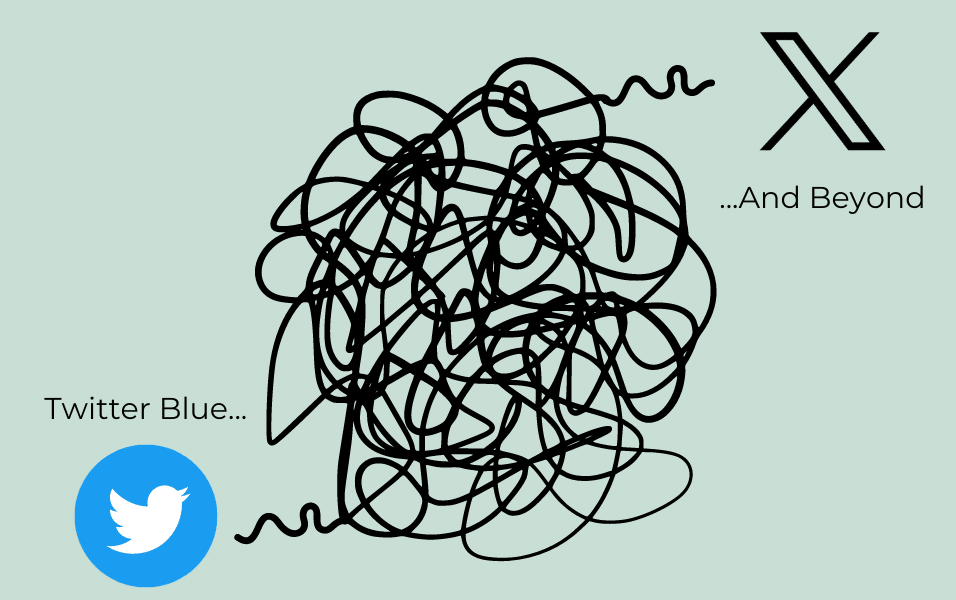Do you remember when Twitter was a trustworthy source for real-time updates on breaking news, politics, celebrity gossip, and personal opinions? Unfortunately, the once-loved site is currently undergoing changes that are raising doubts and sparking debates across the internet. Twitter, now X, is seemingly undergoing a collapse that extends beyond technological issues – it is also becoming a shell of its former self.
Although many people may be struggling to see Twitter’s value, it is important to remember that it still enables countless conversations and connections for its users worldwide. The platform has been – and continues to be – a place where people can express their ideas and connect with others who share similar interests. Some businesses see the advantage in keeping active on Twitter if they have an audience there. However, for many users, the value of remaining on the platform leaves much to be desired.
Twitter’s Transitional Uncertainty
The app has been impacted by massive disruptions just months after Elon Musk took over the corporation. A particularly notable incident saw all links to external websites suddenly cease to function leaving users frustrated and perplexed. Even the widely used Tweetdeck was not spared from these technical hiccups. Such disruptions aren’t unprecedented, of course, but they’ve taken on a new level of unpredictability under Musk’s leadership.
A critical blow was dealt by the mass layoffs that saw more than half of Twitter’s workforce ousted. The aftermath left essential teams dealing with bugs, content moderation, and advertiser relations shorthanded and struggling to keep the platform afloat.
Twitter’s Unconventional Path
The consequences of Musk’s unconventional approach go beyond technological issues. His belief in “free speech absolutism” motivated him to reinstate accounts previously suspended “permanently” for numerous violations. This policy change unintentionally fuelled an increase in hate speech, raising questions about the platform’s commitment to providing a safe environment for users. This is one of the main reasons people have departed in droves for other online platforms where they feel more comfortable discussing their ideas.
Musk’s excursion into product development hasn’t been any smoother. The ambitious Twitter Blue, designed to offer a paid version of the platform with the perk of a verification badge, suffered from a botched rollout. Musk’s intention to level the playing field inadvertently led to spam and impersonations. And while Musk pledged a renewed paid API version, his abrupt termination of third-party app support tarnished the company’s relationship with developers who had enriched the platform.
Some were initially encouraged by Musk’s takeover of Twitter – perhaps the billionaire entrepreneur could breathe new life into a stagnant platform, for example. Under Musk’s leadership, investors, corporations, and regular users were optimistic about the platform’s revival. He was perceived as a free speech advocate who could broaden the range of voices on the app. Unfortunately, the reality is far from these initial expectations.
The Disconnect Between Musk’s Vision and Twitter’s Reality
The business side of Twitter is under threat, as evidenced by the departure of 500 major advertisers since Musk’s takeover. Advertisers are concerned about Musk’s erratic behaviour and the alarming surge in hate speech. The top 30 advertisers cut their spending on Twitter by an average of 42% under Musk’s tenure so far. His solution of encouraging more users to pay for subscriptions hasn’t been successful, with less than 0.2% of monthly active users opting for paid plans.
Contrary to Musk’s claims of Twitter’s growing user base, external data tells a different story. Traffic was higher before, and the app’s growth continues to decline. Twitter’s trustworthiness is deteriorating, and Musk’s goal of a more open and inclusive space remains mostly unrealized.
Elon Musk’s aspirations to revolutionize Twitter appear to be taking a different course than anticipated. The company’s financial future is uncertain, user trust is waning, and the promises of a more open platform are mired in inconsistencies. X’s journey has been anything but smooth sailing – but will it be able to reclaim its former glory, or will it go down in history as just another app that couldn’t make it through the transition? Only time will tell.
An Honest Opinion
Philip Berne, a Senior Editor at TechRadar, recently published his opinions about the perceived negative changes Twitter has undergone since Musk took over. His article, aptly titled “Sorry, Elon Musk, I Signed Up for Twitter, Not X. Now It’s Time to Go,” provides several reasons why he, as a once avid user of the platform since 2009, has decided he is now done with it. Berne sums his opinions up with the following lines:
I didn’t sign up for Twitter: The Payments App. I didn’t sign up for goods and services. I didn’t sign up for Everything. I signed up for Twitter.
For everything that Elon Musk has ‘accomplished’ since he bought Twitter, the biggest thing he hasn’t been able to deliver is Twitter.
Over to You
As a business owner, you should always consider which social media sites are ideal for your organization. X (formerly known as Twitter) has recently become a less popular platform for many, especially since its reach and capabilities can be hindered if you do not have a verified account. So, is being “verified” worth the monthly fee? Depending on your business goals, resources, and audience’s preferences, it may be worth it. Or you may be interested in diving into alternative platforms. Whatever you choose, MYOB Inc. will be watching, assessing, and helping you with your strategy.
Written by: Jennifer Hanford, MYOB Blogger

